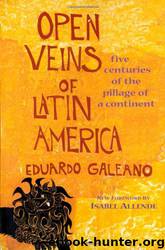Eduardo Galeano by Open Veins of Latin America

Author:Open Veins of Latin America [America, Open Veins of Latin]
Language: eng
Format: epub
Published: 0101-01-01T00:00:00+00:00
Part II
~
Development Is a Voyage
With More Shipwrecks
Than Novigators
171
172
4. Tales of Premature Death
A DECL.ARATION OF INDEPENDENCE
HAILED BY BRITISH WARSHIPS
When George Canning, the brains of the British Empire, was celebrating its worldwide triumphs in 1823, the French charge d'affaires had to swallow the humiliation of this remark: "Be yours the glory of victory followed by disaster and ruin, be ours the inglorious traffic of industry and an ever growing prosperity.... The age of chivalry is gone; and an age of economists and calculators has succeeded." London was entering a long period of festivity; Napoleon had finally been beaten some years earlier, and the curtain was rising on the era of Pax Britannica. In Latin America, the power of landlords and rich port merchants had been secured in perpetuity by independence, at the cost of the newborn countries' imminent ruin. The former Spanish colonies and Brazil were markets hungry for English textiles and pounds sterling at so much percent. Canning did not err when he wrote in 1824: "The deed is done, the nail is driven, Spanish America is free; and if we do not mismanage our affairs sadly, she is English. "1
The steam engine, the mechanical loom, and the perfection of textile machinery had precipitously matured Britain's Industrial Revolution. Factories and banks multiplied; the internal combustion engine modernized navigation and big ships sailed to the uttermost parts, expanding 173
British industry. The British economy paid with cotton textiles for the hides of Rio de la Plata, the guano and nitrates of Peru, the copper of Chile, the sugar of Cuba, the coffee of Brazil. Throughout the nineteenth century industrial exports, freightage, insurance, interest on loans, and profits on investments fed British prosperity. Actually, much of the legal commerce between Spain and its colonies, before the wars of independence, was British-controlled--apart from the steady flow of contraband to Latin American coasts, effectively screened by the slave trade. The overwhelming majority of goods passing through Latin American customs houses was not Spanish. Spain's monopoly had never in fact existed: "The colony was already lost to the metropolis well before 1810, and the revolution was no more than political recognition of this state of affairs."2
British troops had taken Trinidad with but one casualty, but the commander of the expedition, Sir Ralph Abercromby, was convinced that other military conquests in Spanish America would not be so easy. Soon afterward, British invasions of Rio de la Plata failed. The defeat confirmed Abercromby's view on the ineffectiveness of armed expeditions and the ripeness of the hour for diplomats, merchants, and bankers: a new liberal order in the Spanish colonies would offer Britain the opportunity to secure nine-tenths of Spanish American commerce.3 Latin American lands burned with independence fever; after 1810, London applied a devious and two-faced policy which fluctuated with the need to favor British trade, keep Latin America from falling into United States or French hands, and avert Jacobin infection in the newly independent countries.
When the revolutionary junta was formed in Buenos Aires on May 25, 1810, British warships saluted it with a salvo of guns from the river.
Download
Eduardo Galeano by Open Veins of Latin America.epub
This site does not store any files on its server. We only index and link to content provided by other sites. Please contact the content providers to delete copyright contents if any and email us, we'll remove relevant links or contents immediately.
| Arms Control | Diplomacy |
| Security | Trades & Tariffs |
| Treaties | African |
| Asian | Australian & Oceanian |
| Canadian | Caribbean & Latin American |
| European | Middle Eastern |
| Russian & Former Soviet Union |
The Secret History by Donna Tartt(19023)
The Social Justice Warrior Handbook by Lisa De Pasquale(12182)
Thirteen Reasons Why by Jay Asher(8882)
This Is How You Lose Her by Junot Diaz(6869)
Weapons of Math Destruction by Cathy O'Neil(6260)
Zero to One by Peter Thiel(5782)
Beartown by Fredrik Backman(5729)
The Myth of the Strong Leader by Archie Brown(5491)
The Fire Next Time by James Baldwin(5421)
How Democracies Die by Steven Levitsky & Daniel Ziblatt(5209)
Promise Me, Dad by Joe Biden(5139)
Stone's Rules by Roger Stone(5078)
A Higher Loyalty: Truth, Lies, and Leadership by James Comey(4945)
100 Deadly Skills by Clint Emerson(4910)
Rise and Kill First by Ronen Bergman(4772)
Secrecy World by Jake Bernstein(4736)
The David Icke Guide to the Global Conspiracy (and how to end it) by David Icke(4696)
The Farm by Tom Rob Smith(4500)
The Doomsday Machine by Daniel Ellsberg(4480)
